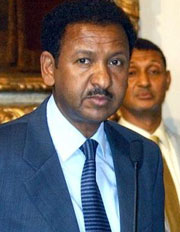|
US
Congress Says Attacks In Darfur 'Genocide'
 |
|
The US Congress said over one million civilians have been internally displaced
|
WASHINGTON,
July 23 (IslamOnline.net & News Agencies) – Intensifying
pressures on the Sudanese government, the US Congress adopted a
resolution dubbing the atrocities in the Western province of Darfur as
"genocide", while Khartoum warned against any military
intervention saying such a move would amount to "Iraq-like
occupation".
Late
Thursday, July 22, the US Congress unanimously passed a resolution
declaring the atrocities being committed in Darfur "a
genocide", and calling on the White House to intervene
multilaterally or even unilaterally to stop the violence.
By
a vote of 422 to zero, the House of Representatives and "the
Senate concurring" passed the resolution, introduced a month ago
by New Jersey Democrat Donald Payne, according to Agence France-Presse
(AFP).
Payne
stressed that in Darfur 30,000 people have been "brutally
murdered", 130,000 have fled to neighboring Chad and more than
one million have been internally displaced by the violence.
The
resolution "declares that the atrocities unfolding in Darfur,
Sudan, are genocide."
It
quoted the UN Humanitarian Coordinator, who said that the violence in
the poverty-stricken region "appears to be particularly directed
at a specific group based on their ethnic identity and appears to be
systemized".
Multilateral
Action
 |
|
"…The same incidents you are now facing in Iraq are going to be repeated in Darfur," said Ismail
|
The
resolution urged the US administration of President George W. Bush to
"call the atrocities ... by its rightful name: 'genocide,' and
calls on it to lead an international effort to prevent it.
It
further calls on the Bush administration "to seriously consider
multilateral or even unilateral intervention to prevent genocide
should the United Nations Security Council fail to act."
The
measure also demands "targeted sanctions, including visa bans and
the freezing of assets of the National Congress and affiliated
business and individuals directly responsible for the atrocities in
Darfur," and urges USAID to help the refugees resettle and
rebuild their communities.
UN
Resolution
In
an apparently coordinated move, the United States Thursday put forward
a draft UN Security Council resolution that could slap sanctions on
Sudan if it does not prosecute Arab militia leaders accused of being
behind atrocities in Darfur.
US
Secretary of State Colin Powell met UN Secretary General Kofi Annan to
discuss the crisis in an effort to tighten the screws on the Sudanese
government and get Khartoum to stop the so-called Janjaweed armed
groups.
"They
have been supporting and sustaining some of these Janjaweed elements.
This has to end," Powell told reporters.
"It's
a catastrophe. People are dying at an increasing rate."
Washington
said it would present a revised draft resolution to the UN Security
Council on Thursday about the situation in Darfur.
British
ambassador Emyr Jones Parry said he thought the 15-nation council
could now "quite speedily" agree on an amended resolution
that would send a "very firm" message to Khartoum.
The
US Congress resolution came one day after reports that British Prime
Minister Tony Blair, who was a key ally to US President George W. Bush
in making the case of Iraq invasion, mulls
a military intervention in Sudan.
Iraq-Like
Situation
The
Sudanese government, on its part, dismissed reports about foreign
plans for military intervention.
Sudanese
Foreign Minister Mustafa Ismail warned that if Britain sent soldiers
to the region, "in one or two months, these forces are going to
be considered by people of Darfur as occupying forces and the same
incidents you are now facing in Iraq are going to be repeated in
Darfur".
Ismail
also said that "more than 60%" of the population in Darfur
were against the rebels and that the Khartoum government was doing its
best to disarm the militias.
Ismail,
currently visiting Paris, further added that Sudan would withdraw
government troops from its violence-wracked Darfur region if Britain
sends forces in.
"If
he (Blair) is to send troops to Darfur, let him inform us officially
and what we will do is withdraw our troops from Darfur."
Ismail
went on saying, if such a development occurred, "we will give him
the chance if he can give security to Darfur".
The
conflict in Sudan's western Darfur region began in February 2003 with
a rebel uprising against Khartoum, protesting that the largely black
African region had been ignored by the Arab government.
|